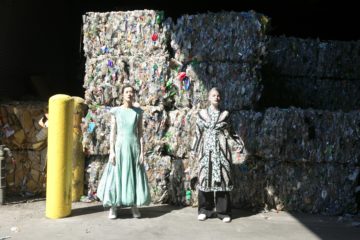The global pandemic of COVID-19 is coming for us from all directions, and with it, we are seeing change just about everywhere. Of course we can’t deny this entire experience to be a distressing and anxiety-riddled time, but from adversity sprouts creativity. All industries are being forced to revolutionise the way they operate, or face the collapse of their world as we know it.

The fashion industry has already been instructed to analyse and question their impact on the environment. Here at FIB we had a look at how this was to be conducted, with an environmental impact report set to examine NYFW and be released in mid-April. Now, with COVID-19 rapidly spreading, the fashion world must act much faster.
Earlier in the year, as global fashion weeks were well underway, the virus began to make a name for itself and cast its web out into the world, though the “pandemic” label had yet to come. Meaning shows were still up and running, fear had yet to set in.
Tim Blanks who writes for The Business of Fashion, remembers the experience:
“On January 10, when I set off for Milan for the men’s fashion shows, Covid-19 was still concentrated in the province of Hubei in China, where it originated. Then, I was preoccupied with the fires in Australia, where I have family and friends. The first case of Covid-19 appeared in Italy on January 30. When I came back to Milan on February 19 for the women’s shows, two more cases had been reported. By the time I left Milan for Paris five days later, that number had jumped to 157.”
It’s safe to speak for most people when we say the world feels inexplicably dooms-day-ish right now. Like Blanks said, prior to this outbreak spreading beyond China, Australia was quite literally on fire. The feeling of an apocalypse was already creeping into our bones. Then we saw floods across our nation, wiping these fires out—a harmonious sigh of relief came from the whole nation. Though things didn’t feel finished. The quick shift from fire to water encouraged us to question mother nature’s response to the damage we’ve been inflicting on her for years, decades, centuries—is this her cry for help?

Matthew Abbott/The New York Times via Redux via abcnews
Not a month later, the pandemic is here now and in full swing, and with its heavy presence comes a glittering, silver lining.
“After little more than a month of Covid-19 and its enforced reduction of human activity, the sky was blue again over once-smog-choked parts of China. There were rumours of swans and dolphins in the canals of Venice. Oh, how we wanted to believe that joyous fantasia of a world without us.” – Tim Blanks
We can visibly see the decline in global warming since the world has stepped back from most of its industrial pursuits. It seems like this is a real chance being handed to us and we would be insane (to put it lightly) if we were to ignore it. Peoples’ mindsets—we hope—are changing. Since things don’t come as easily as they once used to (ahem, toilet paper) their consumerism attitude is changing. Although us Australians saw it loud and clear amongst all the fires and floods, the immediacy behind the pandemic, as opposed to the “unforeseeable” threat of climate change, fuels our actions with more urgency.
“Consider the biggest issue facing fashion before the onslaught of Covid-19: sustainability…Overnight, sustainability means tomorrow, never mind next season, let alone next year. And it’s not just the immediate shock to the supply chain and sales. The habits, preferences and sentiment of shoppers will change — are changing already — and this is only the beginning, when “change or die” becomes a necessity, not an option.” Tim Blanks
While some major companies have the funds and resources behind them to make the shift a swift, economical one, there are others who are not as fortunate. Perhaps we will see more brands fold and close their doors before we see a large transformation to a wholly sustainable market.
Local and beloved, iconic swimwear and clothing brand Tigerlily has just announced their collapse, blaming the coronavirus pandemic for the drop in sales. Appointed administrator for the brand, Scott Langdon told The Sydney Morning Herald that COVID-19 was the “core reason” for Tigerlily’s demise. Though with recent chief executive Chris Buchanan and chief financial officer Steven Hill both leaving the company, it appears they had been on shaky ground for a little while.

It’s a shame seeing an important Aussie brand close up shop, particularly after they had recently done a re-brand, shifting to a more sustainable practice. It leaves us with a lot of questions, that I assume we will gather the answers to in the coming months: who is going to thrive and survive? Who is going to change and grow with this urgency to protect our environment and our retailers?
Predicting consumers trend is never an easy one. People are out of jobs, working reduced hours and struggling to get by. Yet, they’re stuck at home behind a computer screen, with bright, shiny advertisements for discount codes from online retailers—who are creating these fancy deals as a means to stay standing.
As a people, we want to support businesses to keep them afloat. We’re trying to prevent the economy from collapsing completely and I suppose stocking up our wardrobes for the day we can hit the streets again is a way to do that. We’ve just got to make sure we’re supporting those sustainable brands and not contributing further to a system so out of wack. So, readers, the time is now to be smart about how you shop and who you shop with.
Subscribe to FIB’s Weekly Alchemy Report for your weekly dose of music, fashion and pop culture news!







